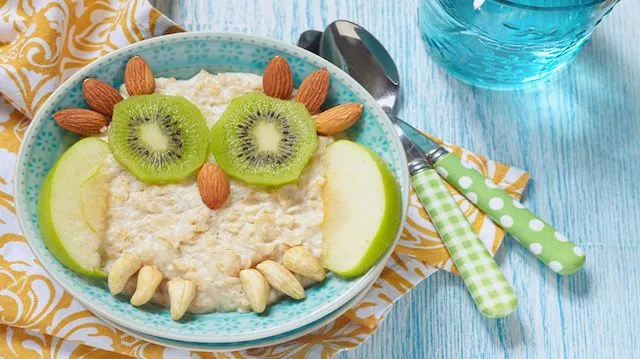
- Share on Facebook85
- Share on Pinterest
- Share on Twitter
Sticking to a healthy lifestyle can be difficult enough, but when we also have to get some picky young eaters on board, it can seem downright impossible!
Fortunately, just like with adults, kids’ eating habits are learned, not based on genetic tastes. So whether you’re trying to make your child’s diet healthy from day one, or change some already established bad habits, it can be done! But you will need some time, patience, and a bit of trial and error. Here are 11 ways to get started.
Make it fun
Many parents don’t like it when their kids play with their food. But the truth is, play, creativity, and fun come naturally to children, so parents may need to embrace this side of their children at mealtimes if they want to encourage healthy eating. This can be done by turning the meal into a story or game and being creative with presentation.
Explain why in their language
“Because it’s healthy” is not really a relatable explanation for why your little ones should eat their broccoli. “Because it will make you stronger, smarter, and give you more energy to play,” might do the trick though!
Pay attention to presentation
The way food looks can make or break a child’s decisions about whether to eat it or not. Every child is different of course, but good places to start include providing a mix of brightly colored foods, making sure there is a lot of space between items, and arranging food in different patterns and shapes (hearts, smiley faces, stars, etc.) on their plate.
Reward good eating habits
Rewarding healthy eating will help kids associate healthy foods with more positive experiences in the future. Small tokens like stickers or doing the child’s favorite activity after dinner are good ways to do this.
Don’t use food to reward or punish
Although rewarding healthy eating is a good idea, most nutritionists do not recommend using food itself as a reward or bribe because it can lead to an unhealthy relationship with food later in life. Nonedible options, like stickers, books, or even planning some special activity as a family, can be used as alternatives.
Variety is key
Kids like to choose what they eat, so putting out a variety of healthy options will make it more likely that something healthy will be eaten. An easy way to do this is to offer an assortment of healthy toppings that children can choose to put on or mix into dishes like chili, tacos, pizza, salads, pasta and soups.
It’s okay to be sneaky sometimes
Kids don’t like kale? Sneak it into smoothies with ingredients they do like. But make sure this is balanced with continuing to offer the food in its whole form, so that they can also get used to the real thing.
Let them cook with you
Actually being involved in the preparation process will make kids a lot more likely to want to eat — or at least try — the product. Safe tasks for kids to do include washing fruits and vegetables, breaking up greens, stirring and mixing cold or room temperature ingredients, sprinkling salt and other herbs, and cutting soft foods with a butter knife.
Shop and garden together
Although shopping in a supermarket with your kids can turn into a nightmare, shopping together at places like the local farmer’s market or CSA can be a great way to introduce kids to a wide variety of vegetables, and let them pick out the ones they want.
Even better: Have your kids help in the garden, if you have one, from a young age. Many kids today don’t realize where food actually comes from. Hint: It’s not the store! Gardening and growing your own food together, even if it’s just something small like herbs, is a good way to give your kids a new view on what they eat.
Be their example
We can’t really expect our kids to eat foods that we don’t even like ourselves. And most parenting experts agree that kids will do as you do, not as you say. So it’s very important that you yourself are modeling the way you want your kids to eat.
Don’t give up!
Research has shown that some kids need to taste a new food up to a dozen times before they will be comfortable eating it. So patience is key, but persistence pays off!
Feeding healthy food to picky eaters can seem like an enormous and frustrating task, but remember that the healthy habits they develop in childhood will stay with them into adulthood. A patient and positive mindset will help you immensely on this journey!
How do you encourage your kids to eat healthy food?
—Teresa Manring
Teresa is a freelance writer and yoga teacher currently living in Sri Lanka. She loves to write about policies, ideas, and practices that promote a healthy planet and create healthy people.
Sources:
http://www.parents.com/kids/nutrition/healthy-eating/get-your-kids-to-eat-better
http://wellnessmama.com/1063/guide-to-feeding-healthy-kids
- Share on Facebook85
- Share on Pinterest
- Share on Twitter

